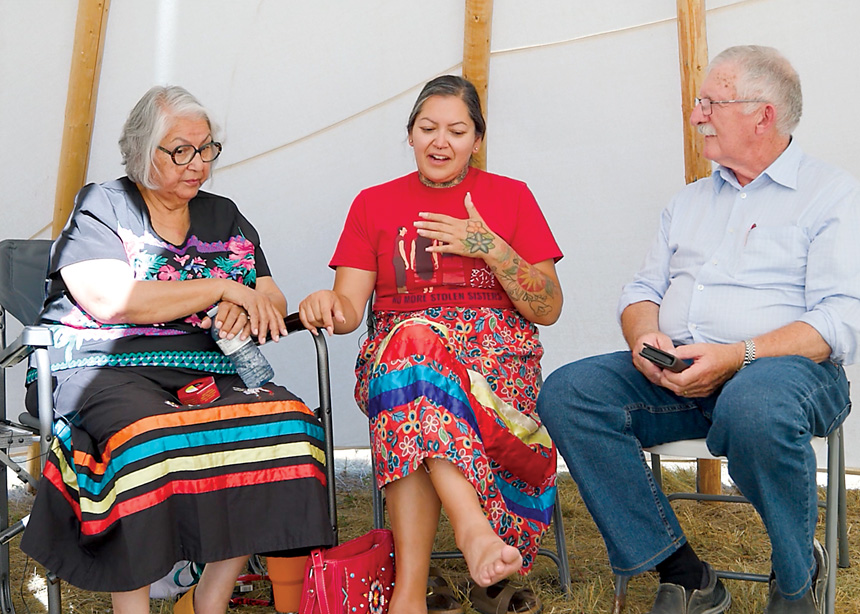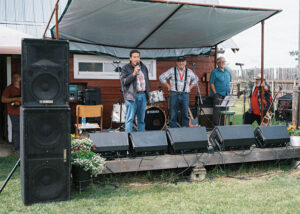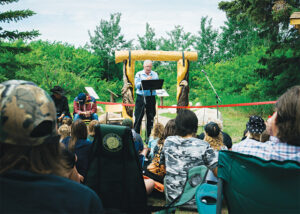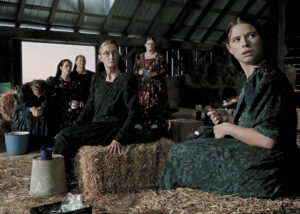The new documentary Reserve 107: A Path Forward tells the story of a small grassroots group that built friendships across religious and ethnic lines and motivated the government of Canada to begin repairing an historic injustice.
The film, directed by Brad Langendoen of Rebel Sky Media, is a companion to the award-winning 2015 documentary Reserve 107: Reconciliation on the Prairies.
That film told the story of a gathering between the descendants of the Young Chippewayan Band and Mennonites and Lutherans from Laird, Saskatchewan, who currently live on the band’s ancestral Treaty 6 land, known as Stoney Knoll Reserve No. 107.
Young Chippewayan representatives, along with Mennonites and Lutherans in the Stoney Knoll area, signed a memorandum of understanding between their communities, acknowledging the descendants’ claim to the land, which had been taken from them by the government of Canada in 1897, and committing to work together for justice.
Leonard Doell said the new film informs and updates Young Chippewayan descendants as well as Mennonites, Lutherans and others about the Stoney Knoll situation. Doell, who attends Aberdeen (Saskatchewan) Mennonite Church, has been involved with the Young Chippewayan for 48 years.
“We’re very hopeful that [a] settlement … will actually be fulfilled in the next short while,” added Doell.
A Path Forward was filmed in the summer of 2024 and contains footage from events that happened after the first film. In 2017, Canadian senator Lilian Dyck invited members of the Stoney Knoll group to Parliament Hill to show Reserve 107 and to share their story with the Senate. But it took until 2022 for the Stoney Knoll land claim to be validated by the Canadian government.
“We’ve got some work to do,” says Gary LaPlante in A Path Forward.
LaPlante, a Young Chippewayan descendant who is affiliated with Moosomin First Nation and lives in Saskatoon, explains that the Canadian government has asked Stoney Knoll descendants to come up with a plan of compensation for the First Nations communities that took in Young Chippewayan band members after their land was taken in 1897. Secondly, the government has also asked that descendants prepare to become a First Nation under the Indian Act.
LaPlante felt the need to explain the status of the Stoney Knoll land claim on film in order to alleviate concerns from descendants who were worried they weren’t being consulted in the process. “There is no settlement,” he reiterated in an interview. “The claim is not settled.”
The Canadian government will have its first meeting with Stoney Knoll representatives in April 2025, added LaPlante. After compensation and reconstitution are discussed, then substantive negotiations can take place, he stressed.
A Path Forward also highlights the ongoing friendships between the Laird community members and Young Chippewayan descendants, the lessons they’ve learned along the way and their hopes for the future, even as the descendants, now recognized as Stoney Knoll First Nation by the Battleford Agency Tribal Chiefs, continue to wait for land to call home.
In the meantime, Wilmer Froese, a Mennonite farmer, helped create the Stoney Knoll Interpretive Site in 2022. It’s a place where gatherings between peoples continue to take place. In the film, Froese says, “Peacemaking became not just a theory but something that actually worked. And I experienced it personally. And that to me has been probably the most important lesson that I learned.
“But it also taught me and showed me that I have to face my own fears. And also become honest with myself, because I really didn’t want to do what we were doing at first. And I just didn’t want to really become involved, and so I hesitated, but I got encouragement from Leonard and from MCC and other people.
“But I had to search my own heart and say: what is the right thing to do here. And finally I really did come to the conclusion that I wanted to be someone who would build bridges and not build walls. Because to build walls, it can be so easy. Building bridges isn’t easy. It can be hard work but it’s also very rewarding.”
In the film, Chief Sylvia Weenie says, “It was just really, really something to see how our nation came together with the Mennonites and the Lutherans…. It showed our young people what it looks like to get along with one another, what it looks like to understand each other, to respect one another, to walk beside each other for a common cause.”
For Doell, learning has happened through relationships with LaPlante and others. “It doesn’t happen overnight. Through eating together and interacting together, views or hearts are changed in the process,” he said.
“Hopefully the government is going to take responsibility for the injustice they’ve created in this whole process,” he added.
Reserve 107: A Path Forward premiered at the University of Saskatchewan’s St. Thomas More College on February 27. Visit reserve107thefilm.com to watch the film.
Film updates Stoney Knoll story

Tags:
Share this article:
Related articles:






Leave a Reply
You must be logged in to post a comment.